#Bandung Conference
Explore tagged Tumblr posts
Text
The first large-scale Asian–African or Afro–Asian Conference (Indonesian: Konferensi Asia–Afrika), also known as the Bandung Conference, was a meeting of Asian and African states, most of which were newly independent, which took place on 18–24 April 1955 in Bandung, West Java, Indonesia.[1] The twenty-nine countries that participated represented a total population of 1.5 billion people, 54% of the world's population.[2] The conference was organized by Indonesia, Burma (Myanmar), India, Ceylon (Sri Lanka), and Pakistan and was coordinated by Ruslan Abdulgani, secretary general of the Ministry of Foreign Affairs of the Republic of Indonesia.
The conference's stated aims were to promote Afro-Asian economic and cultural cooperation and to oppose colonialism or neocolonialism by any nation. The conference was a step towards the eventual creation of the Non-Aligned Movement (NAM) yet the two initiatives ran in parallel during the 1960s, even coming in confrontation with one another prior to the 2nd Cairo NAM Conference in 1964.[3]
In 2005, on the 50th anniversary of the original conference, leaders from Asian and African countries met in Jakarta and Bandung to launch the New Asian–African Strategic Partnership (NAASP). They pledged to promote political, economic, and cultural cooperation between the two continents.[citation needed]
video {jason chu}
#tiktok#Bandung Conference#CIA#JFC#colonialism#colonisation#africa#asia#history#imperialism#propaganda
5 notes
·
View notes
Text
I am Japanese, but definitely not Asian! (Essay)
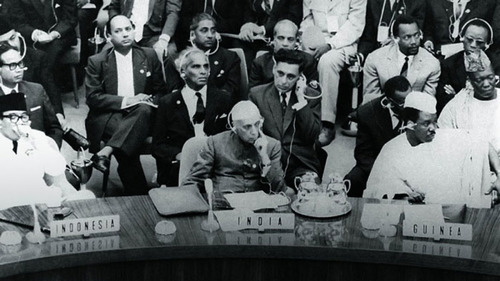
Bandung Conference
A Japanese university professor once preached, "Japanese people should be aware of themselves as Asians!" However, the concept of "Asia" is merely a concept defined by Westerners and imposed on them. All Asian countries except Japan and Thailand became colonies of European countries without exception. It is only natural that the stupid Asian peoples were dominated by Europeans.
Thailand was only an independent country due to the balance of power between Britain and France, so Japan was the only truly independent country in Asia. Asian countries that were cowardly subordinate to Europeans were able to become independent because Japan went on a rampage in WWII, and the people of Asian countries realized the limitations of Europeans. And so, at the Bandung Conference Thailand in 1955, many independent countries were born in Asia and Africa like bamboo shoots after rain.
However, Japan today is not doing well; its population is decreasing, and the Japanese government is allowing many Asians into the country. However, they are of low quality. Vietnamese and Cambodians are a "group of idiots" who mainly steal copper wires from solar power generation facilities. I don't want to be called an Asian like these people. I don't want to be lumped together with these idiots! That's what I think. Japan is not so depraved that it should be called Asia.
Rei Morishita
私は日本人であり、アジア人では断じてない!(エッセイ)
バンドン会議
ある日本人の大学教授が、「日本人はアジア人としての自覚を持て!」と教えを垂れたそうだ。だが「アジア」という概念はあくまで欧米人が規定した概念に過ぎず、押し付けられたものである。そして日本とタイ以外のアジア諸国は、例外なくヨーロッパ諸国の植民地になった。間抜けなアジア諸国民がヨーロッパ人に支配されたのは、至極当然である。
タイはイギリスとフランスの力のバランスで独立国であったに過ぎぬから、本当の独立国はアジアでは唯一日本だけであった。そしてヨーロッパ人に意気地なく従属していたアジア諸国が独立できたのも、日本がWW2で大暴れし、ヨーロッパ人の限界をアジア諸国民が知ったからである。それで1955年にバンドン会議で、アジア、アフリカに、雨後の竹の子のごとく独立国が多数誕生したのである。
ところが今の日本は元気がなく、人口も減っていて、日本政府はアジア人を大量に入国させている。ところが彼らは質が低い。ベトナム人やカンボジア人は、専ら太陽光発電施設の銅線を盗む「低能者集団」である。私は、こんな奴らと同じアジア人とは言われたくない。このような馬鹿どもと同じにされてたまるか!と私は思う。日本は、アジアと呼ばれるほど落ちぶれてはいない。
森下礼
#I am Japanese#but definitely not Asian!#essay#rei morishita#babylman#Asia#Westerners#the stupid Asian peoples were dominated by Europeans.#Thailand#Bandung Conference#Japan#Vietnamese and Cambodians are a “group of idiots”#steal copper wires from solar power generation facilities#idiots#Vietnamese#Cambodians#Japan is not so depraved that it should be called Asia.
1 note
·
View note
Text
Malcolm uses the 1954 Bandung Conference of African and Asian nations as a model for black unity in America.
Join the Pan African Movement and let us put the exact same fear back into the shit people who call themselves white, but this time we will not allow anyone who believes in the social construct of races and whiteness. These stupid people are not allowed to attend and neither are their slaves who believe as they do because we are tired of pretending that anyone who calls themselves white are good people.
1 note
·
View note
Text
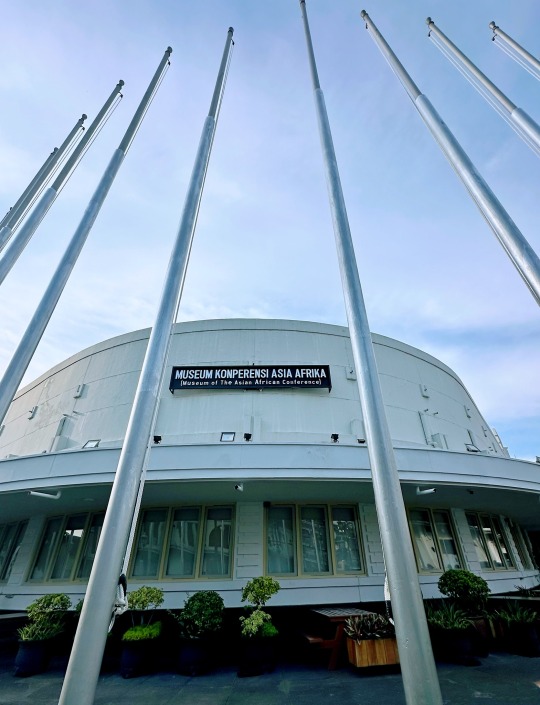
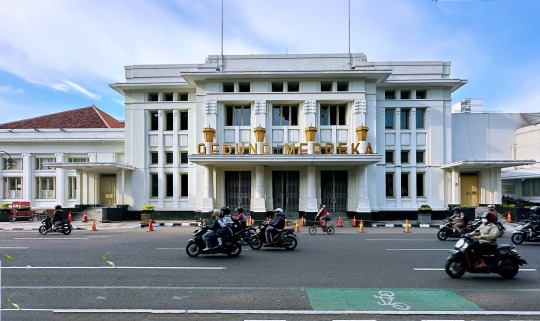
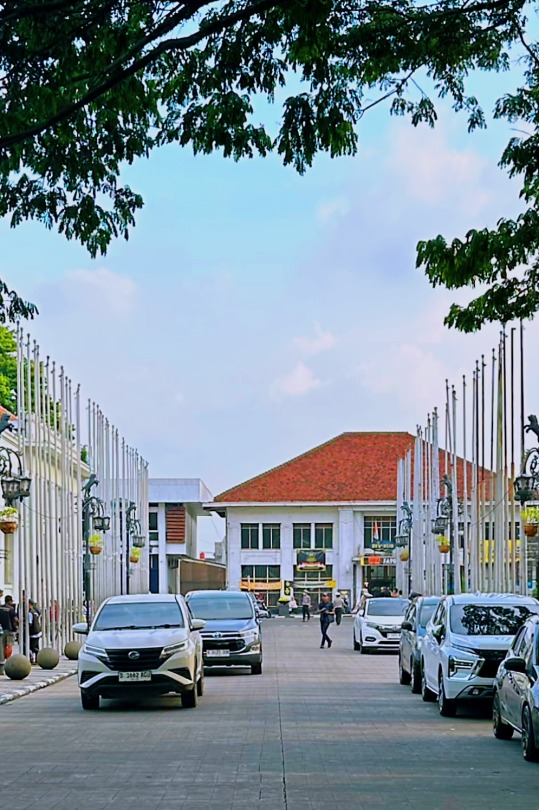
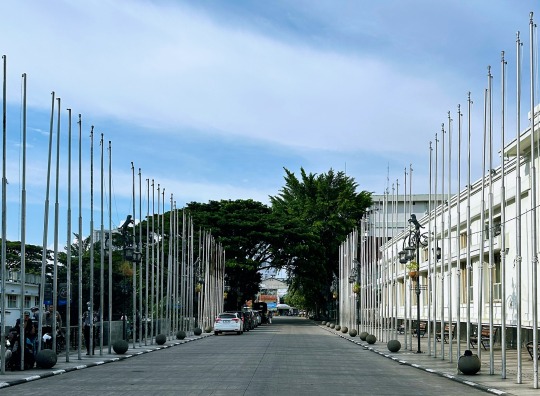
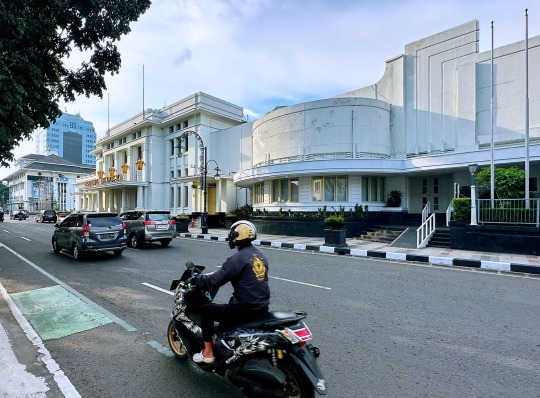
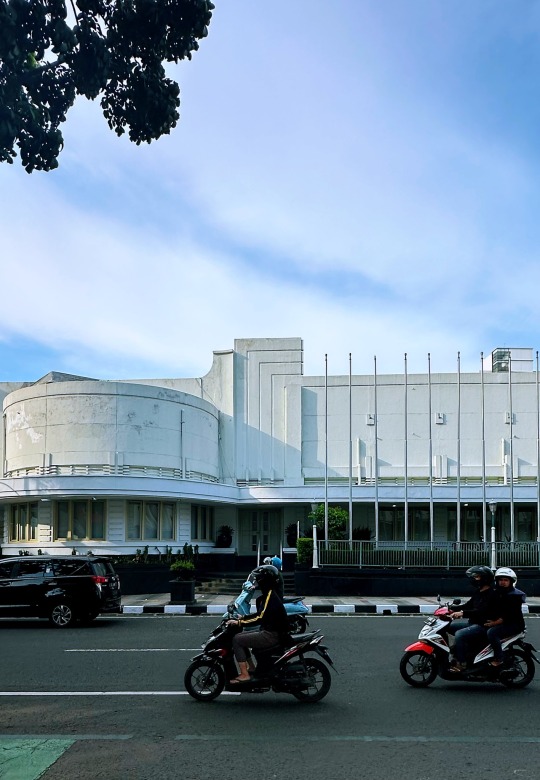
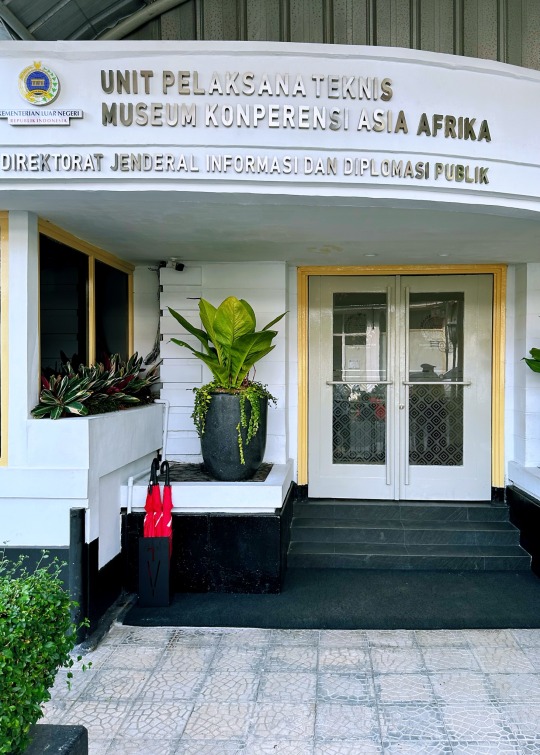
Visited the Independence Building in Bandung where the first Asian-African Conference or the Bandung Conference was held in 1955, without the presence of colonialist countries who preferred no equal dialogue but lecturing from so-called a position of strength, which USA is doing.
0 notes
Text
From the Bandung Conference to the Third World Liberation Front, to the flow of ideas between the Black Panthers, Brown Berets, American Indian Movement, and Asian American Movement;
120 notes
·
View notes
Text
Unrolled twitter thread by Progressive International (@ProgIntl)
30 Sept 24 • 4 minute read • Read on X
On 30 September 1965, the Indonesian military, working closely with the US government, initiated a coup that would depose President Sukarno and install the brutal, 30-year dictatorship of General Suharto.
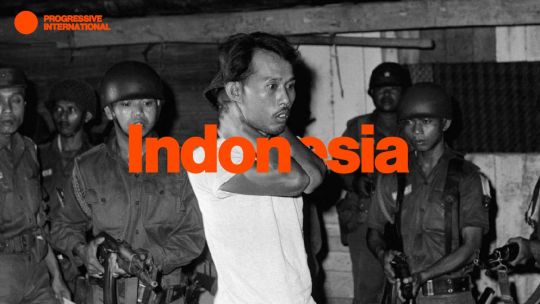
In the dark years that followed, the dictatorship massacred over a million Indonesian communists, with the CIA and US diplomats drawing up “kill lists” for the Indonesian military. The operation would become a template for the US’s regime change operations for decades to come.
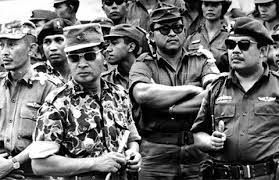
Major-General Suharto with Indonesian Army in 1966
In 1945, President Sukarno led Indonesia to independence from Dutch colonial rule. He championed the Non-Aligned Movement and hosted the historic Bandung Conference, a meeting of Afro-Asian states, in 1955.
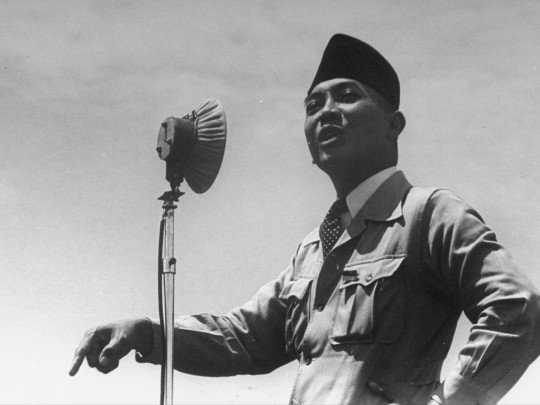
First President of Indonesia Sukarno making a speech circa 1945
Opening the conference and forecasting what was to come, Sukarno said: “We are often told ‘Colonialism is dead’. Let us not be deceived or even soothed by that… Colonialism also has its modern dress, in the form of economic control, intellectual control, actual physical control by a small, but alien community within a nation.”
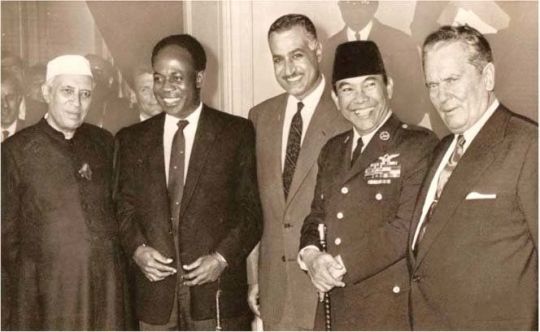
Leaders attending the Bandung Conference 1955 in Bandung, Indonesia. From left: Indian Prime Minister Jawaharlal Nehru, Ghanian Prime Minister Kwame Nkrumah, Egyptian Prime Minister Gamal Abdel Nasser, President Sukarno, and Yugoslavian Prime Minister Josip Broz Tito.
By 1965, Indonesia possessed one of the world's largest communist parties, the PKI. The PKI had a mass membership and mobilized vast numbers of people in the battle against Indonesia’s ruling class.
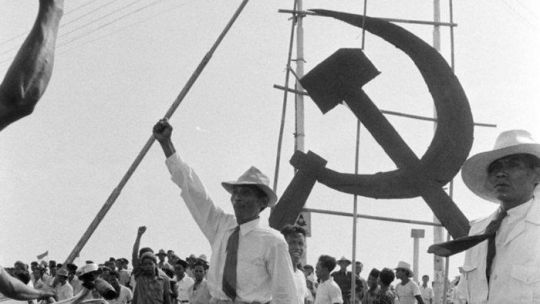
Campaign of the Indonesian Communist Party (PKI) in September 1955.
Terrified by the strength and organization of Indonesia’s people, the Indonesian military’s 30th September Movement began to purge the PKI.
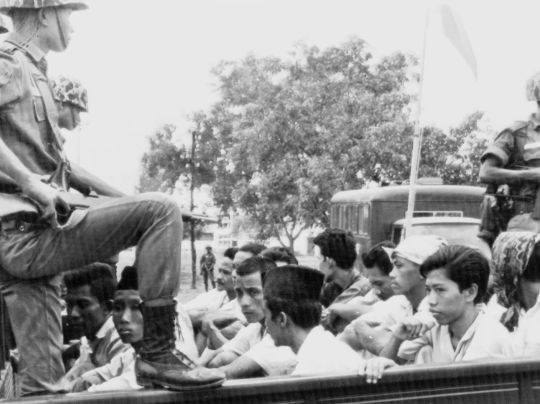
Men suspected of being IPK members being transported under guard by an armed Indonesian soldier
In the early hours of 1 October, a group of military conscripts murdered six high-ranking generals. Blaming the deaths on the PKI, Suharto used the attacks as a pretext to seize power. CIA communications equipment allowed him to spread false reports around the country and begin a long campaign of anti-communist propaganda.
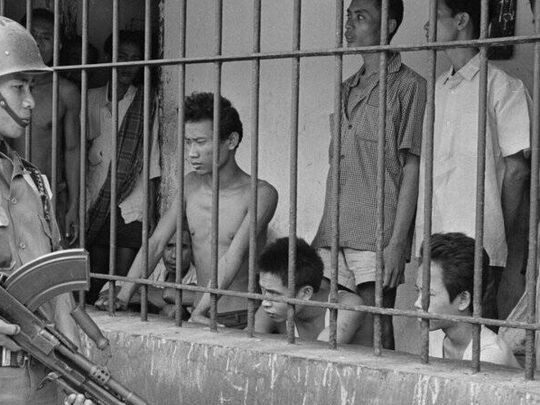
The US had tried to overthrow Sukarno for years; in 1958, the CIA backed armed regional rebellions against the central government. In 1965, they did all they could to aid Suharto’s murderous power grab.
The campaign soon became genocidal. On islands like Bali, up to 10% of the population was massacred — and luxury hotels soon began to appear over the killing fields.
One US embassy staffer told the US press that Suharto’s military “probably killed a lot of people, and I probably have a lot of blood on my hands, but that's not all bad.”
Time Magazine referred to the killings as “the West’s best news for years in Asia”.
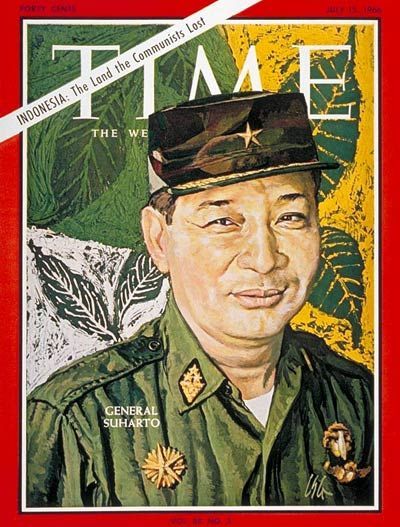
A cable from the US embassy’s first secretary, Mary Vance Trent, to the State Department referred to events in Indonesia as a “fantastic switch which has occurred over 10 short weeks”. It also included an estimate that 100,000 people had been slaughtered.
Cementing his power, Suharto became president in 1967. His ‘New Order’ policy allowed Western capitalism to exploit Indonesia’s cheap labour and plunder its natural resources. Civil rights and dissent were suppressed.
In one of the world’s most populous countries, any possibility for the emergence of a new, democratic political project was eliminated. Richard Nixon described Indonesia as “the greatest prize in Southeast Asia”. Suharto would not leave office until 1998.
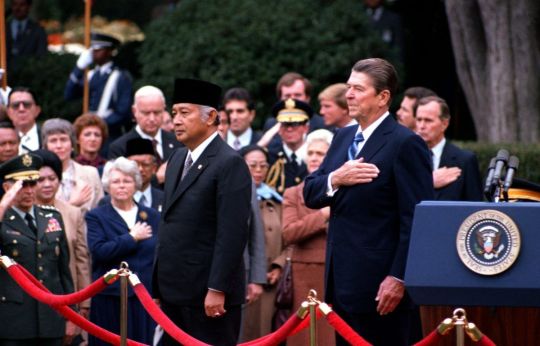
U.S. President Ronald Reagan stands with Indonesian President Suharto in the White House South Lawn at the arrival ceremony for Suharto's State Visit. Oct 12, 1982
CIA officers described Suharto’s rise to power and anti-communist purge as the “model operation” and “Jakarta” soon became the codeword for anti-communist extermination programs in Latin America, where hundreds of thousands were massacred in regime change efforts engineered by Washington.
#cold war#us imperialism#american imperialism#western imperialism#indonesia#indonesian history#politicide#indonesian genocide#cia#world history#general suharto#president sukarno#anti imperialism#communist history#decolonization#colonialism#southeast asia#1965 genocide#30 September Movement#balinese genocide#bali#indonesian killing fields#progressive international#knee of huss
73 notes
·
View notes
Text
4 notes
·
View notes
Text
indulge me in blorboposting. it was really funny to read that Romulo who lead the Philippines' delegation at Bandung was like yeah we were all making fun of Zhou Enlai and he sucks:
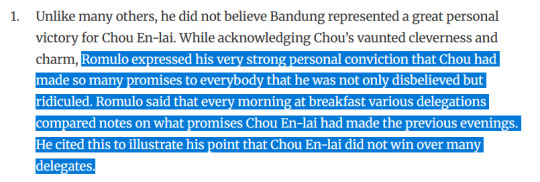
(source) because everyone else was like "we all loved him". what Romulo was saying at the conference was unpopular for being too pro-American and this take was clearly cope. but his "strong personal conviction" was that Zhou was ridiculed? It seems that Kotelawala who lead Ceylon's (Sri Lanka) delegation didn't like him either (best source I can find, last page of this, but it's like. my own conjecture) but that's another clear pro-American, strongly anticommunist type.
but everyone else says everybody loved him. the British ambassador to Jakarta clearly thought he won everybody over (source):
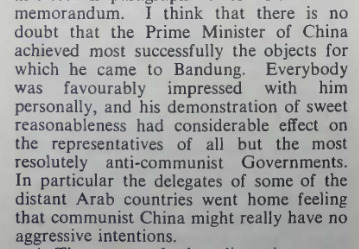
the CIA said the same (source):
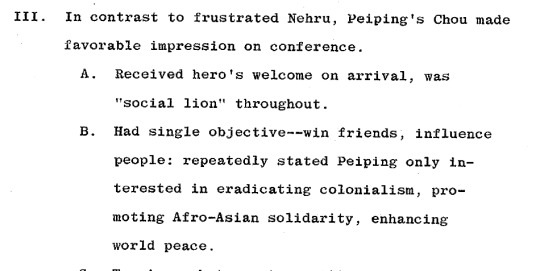
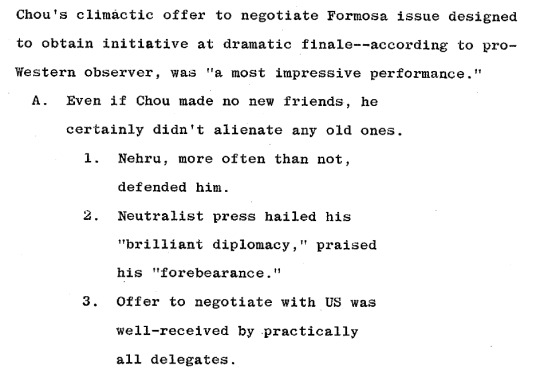
my point here is that this very strongly creates the mental image of the philippines' delegate and the couple other guys at his lunch table among the 300 at Bandung absolutely convincing themselves "everybody thinks this guy is SO lame" every time Zhou talks meanwhile everyone else is genuinely taken with him. my point here is less that he achieved some concrete goals for China (not really that at all, which US Secretary of State at the time Dulles noted) but more that he made everybody like him. and he did! everybody except one guy with the "we were all laughing at him, really!" take.
That's all that's the whole post, nothing really of substance. Enjoy your evening!
#cal txt#1972 nixon national security council rp tag#i havent read it yet but yes i am gonna read that biography of him (zhou enlai) that got an English translation last year!#but it's 900 pages long so it's like. on the list (eventual)
4 notes
·
View notes
Text
Is China a part of the global south?
Beijing certainly thinks so. For instance, at the recently concluded Forum on China-Africa Cooperation, a conference held every three years between China and African leaders, Chinese President Xi Jinping spoke of the global south’s “shared path toward modernization.” China has set up a development fund containing the term “South-South.” And Foreign Minister Wang Yi has also explicitly stated more than once that China is and will always be a member of the global south.
Though the terms used have changed over time, China’s rhetorical embrace of the developing world is not exactly new. Its roots go back to the early years of Chinese Communist Party rule. After the revolutionary fervor of the early 1950s subsided somewhat, China participated in the historic 1955 Bandung Conference that brought Asian and African leaders from recently decolonized countries together in a common front against global inequities. In 1964, Premier Zhou Enlai, Mao Zedong’s righthand man, formulated China’s Eight Principles for Economic Aid and Technical Assistance to Other Countries. Mao’s own worldview defined two “intermediate zones” between the United States and the Soviet Union, the latter zone comprising Asia, Africa, and Latin America.
The intermediate zones framing later morphed into the Three Worlds theory in 1974. In a conversation with Zambian President Kenneth Kaunda, Mao defined the “Third World” as including Africa, Latin America, and all of Asia, except Japan. This brief reference was elaborated on at length in a famous speech by Deng Xiaoping to the U.N. General Assembly in the same year, in which he said: “China belongs to the Third World.”
Mao, like many of his contemporaries, defined the Third World in predominantly economic and postcolonial terms. The framing made sense in the 1970s, when China was among the world’s poorer countries. The average Chinese lived no better, and in some cases worse, than the wide swath of recently decolonized countries.
Fast-forward to today, and much has changed. A different understanding of the meta-region stretching from Latin America to Southeast Asia and the Pacific Islands is needed—and in turn, China’s place within it must be reconsidered.
In this meta-region, 45 states that the United Nations has dubbed “least developed countries” remain mired in poverty and, in some cases, state failure. But about 80 others have grown substantially. Many, especially in Asia, made globalization and capitalism their own and turbocharged growth with corresponding social investments. They industrialized, integrated with the global economy, and built respectable levels of domestic infrastructure.
China itself is among the biggest beneficiaries of this transformation—from a country that experienced state-induced famines during the disastrous 1958-62 Great Leap Forward to now a highly industrialized, upper-middle-income country.
As economies diverge and the colonial era recedes into the past, the term “global south” has gained currency, especially since Russia’s invasion of Ukraine in 2022. It is best described as a “geopolitical fact,” a vast middle that sits outside the great-power system made up of the three great powers and core U.S. allies in Europe, East Asia, and Australasia. The “rest” have achieved varied levels of economic and social development but remain outside the select club of core alliances and global rulemaking. By definition, therefore, a great power cannot be a part of the global south.
China’s sheer size; high levels of GDP, trade, investment, and increasingly innovation; and successful military modernization mean that it now qualifies as a great power. It has joined Russia and the United States in this select category—though the United States is clearly the most powerful of the three and Russia barely makes the grade.
China is indeed working closely with a few global south states on major issues, for example with Brazil on a Ukraine peace plan, and as a part of the BRICS grouping. But Beijing’s global south rhetoric, while drawing on a real shared history, is today a stratagem, designed to win influence among the developing world and further its aims of influencing the global order. If anything, China’s emergence as a great power opens the door for a divergence from the global south on three important fronts: trade and investment, climate, and geopolitics.
Divides on trade are already visible. Middle-income global south countries such as Indonesia and Chile have recently slapped tariffs on Chinese imports as China has increasingly shifted into advanced manufacturing. Jakarta has just banned a giant Chinese online retailer, citing threats to local businesses. Mexico wants to reduce Chinese imports in its supply chain. Concerns over local trade have also triggered actions against Chinese imports in Brazil.
Meanwhile, Beijing’s flagship investment program, the Belt and Road Initiative, has become much smaller and more targeted of late, with spending falling off sharply as a slowing China focuses more at home. China is also on the “other side” when it comes to negotiating debt relief with poorer states in the G-20’s Common Framework, an odd position for a nation that claims to still be developing.
China and the global south have historically cooperated closely on climate change in the G-77+China coalition. They routinely push the U.N. principle of “common but differentiated responsibilities” (CBDR) and legitimately demand much greater climate finance commitments from wealthy states. The CBDR principle puts the onus on financing the energy transition on the global north, since wealthy countries have been the dominant contributors to destructive climate change due to their much larger cumulative carbon emissions. Unsurprisingly, Washington tends to minimize or ignore CBDR in climate negotiations.
But China’s own emissions have risen to the point that it has itself become a major contributor to not only annual but also historical emissions. With 14.7 percent of the global share, China now ranks third in cumulative emissions since 1750, not far behind the United States and the European Union. (The leading global south emitter, India, comes in much lower at nearly 3.4 percent.) The CBDR principle puts China on the side of wealthy states much more than developing countries.
China could justifiably point to its already significant efforts as a source of climate finance. But it will resist what should be a logical shift in its status and oppose formally taking on climate finance targets.
China and the global south may also yet diverge on the broader geopolitical plane. Highly militarized U.S.-China competition can destabilize the global order and risk major conflict; it is therefore not in the global south’s interests. Any actions by Beijing contributing to regional or global destabilization will not be welcomed in the global south. (The same is true for any such behavior by Washington.)
But China’s relative weakness compared with the United States, and an economic slowdown at home, also creates incentives for a revived G-2 in order to craft updated rules of global governance. Xi seemed to propose exactly this last year.
Washington is currently in no mood to engage in such a conversation with Beijing due to China’s perceived threat to its global primacy, sharp differences over Taiwan, and the Russia-Ukraine war. But as planetary challenges multiply, and as China closes the gap in strategic innovation despite its economic crunch, both sides may be incentivized toward deeper, though sectoral, cooperation—perhaps after a nasty crisis that stops short of war.
Any new, future G-2, even if partial, would sit uneasily with most of the global south, as the latter’s demands might not be factored in a backroom deal between the two most powerful states in the international system. The very act of excluding these states from such a conversation would also rankle. The net effect would be to widen their divide with Beijing.
China could bridge its growing gap with the global south by being more proactive on issues such as debt, climate, and trade and refraining from provocative actions in theaters such as the South China Sea. Continuing U.S. failures that cost the lives of innocents (such as in the Middle East escalation) or U.S. over-militarization in Asia could also ensure China remains attractive in Asia, Africa, and Latin America.
While Beijing has traditionally enjoyed a natural convergence with the global south, the future looks a lot more complicated.
5 notes
·
View notes
Text
Helloooo peeps I'm back because I'm bored, go figure /smacked
A lot has happened since I really, actually went into hiatus, aka not opening tumblr at all for months to keep sane, haha. But they can be summarized into just three points.
First, I managed to pass the first stage of the scholarship selection process and had the interview. 🥹
It was very nerve-wracking, because I can't control what will happen in an interview. I don't even know what questions the interviewers would ask, even though I already consulted a friend of mine who got the same scholarship last year.
I think I did well, all things considered, because the interview happened ONE DAY before my second big thing. Read on...
Second, I presented in an international conference!! 😎
Yaay go me! I think I fumbled it because my mind went blank when I had to answer a question (I passed the mic to my boss in panic... pfft), but all I got was appreciation. The conference set a new high for my public speaking experience. It was such a safe place to share my work... I loved it there.
Third, I went abroad for the first time in my life!! 🥳
It didn't feel too different because I "only" went to Penang and it mostly felt like I was in the older parts of Bandung, but it was still a new experience. The roads were silent, for one 🤣 In Jakarta, you have the sound of klaxons in every non-residential road, but in Penang, everyone waits for each other. My ears were blessed by the nonexistent honking sounds /lh
Anyway, I went there for the conference I talked about in the second point. It was paid for by the office, so the only times I took money out of my (figurative) pocket were when I bought a new pair of shoes (my old pair HURT my feet because I wore slightly thicker socks) and when I bought Penang coffee for my friends back home.
Circling back to the scholarship thing, I'll have the results by November 7... it's still 3 weeks away aaaaaaaaaaa *rolls around*
Wish me luck! 💕
(and if you're still reading, thank you so much for caring about ol' Risu here! 🥺)
#kurisu babbles#man that was quite long hsjsbfns#I'll get to tagged posts after this#I'm scared to go through my notifs ahahahahahaaha /j /lh
4 notes
·
View notes
Text
21st century Bandung conference when. 21st century Abdel Nasser when. 21st century Iranian, Cuban, Soviet, Chinese Revolutions to transform the global power balance & crush the capitalist & colonialist forces when !!!!!!!! 2024 please save humanity.
11 notes
·
View notes
Text
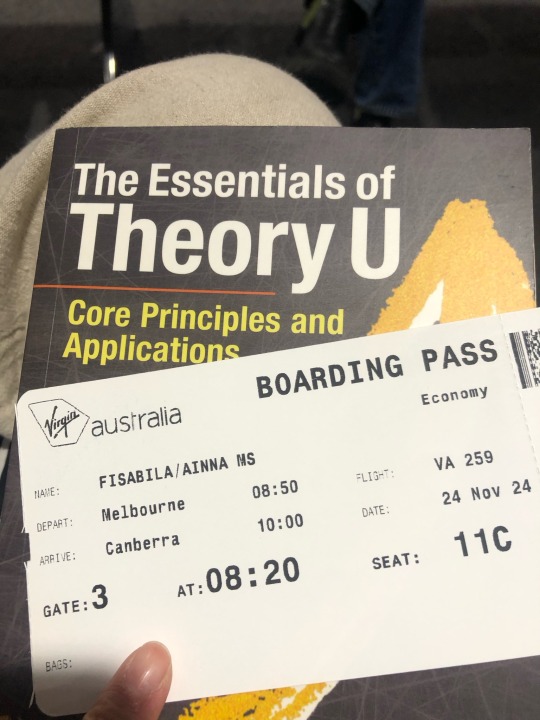
Pagi ini pergi ke Camberra untuk conference. This is my very first time travel inter-state. Excited banget tapi agak sedih juga soalnya cuman sendirian gak sama anak / keluarga :”)
Walau emang rasanya seneng juga ada “Me Time” tapi kalau udah berkeluarga tuh rasanya kadang pengen menikmati tempat baru, pengalaman baru dengan mereka :”)
Anyway, Alhamdulillah tsumma alhamdulillah, karena travel interstate kali ini beneran dibayarin pesawatnya dan hotelnya. Dan insyaAllah besok aku akan present lagi tentang hasil literature review-ku tntg breastfeeding impact on environment sustainability. Dan karena ini conference ketiga jadi agak lebih chill, walau ttp abs ini latihan of course.
Sebagai anak yang tidak punya banyak privilage, kebanyakan travel dari satu tempat ke tempat lain tuh ya karena ikutan acara, volunteering, lomba atau pelatihan.
Mulai dari dalam negeri kaya ke Bogor, Bandung, Palu, Balikpapan, Makassar, sampe ke Thailand, Jepang, Vietnam, Belgia dan Amerika! Ya karena ikutan sesuatu, bukan krn orkay liburan ya 😭😂
Kalau dulu S1 banyaknya ikutan training leadership atau hal yang berbau community development atau Social Entrprise. Sekarang mau mulai mencoba hal baru yaitu dunia riset!
Dan setelah ikutan 2 kali conference, satu internal kampus, satu se-Australia raya. I could say, kalau riset itu tujuannya sama persis dengan kita membangun comdev atau socent, yaitu for the public greater good! Sama2 presentasi “temuan”, sama2 presentasi hasil karya.
Terus akutuh jadi berpikir, oh yg membuat aku cocok sama dunia riset itu karena value yang sama dengan membuat comdev/socent, yaitu for the public greater good.
Tapi somehow, aku juga berpikir, kalau orang di third sector (NGO-CSO things) dan akademik ngelakuin buat kebaikan ummat manusia. Kenapa “kebaikan” tersebut gak bisa dicapai? Mungkin jawabannya karena most business not really doing good. Most business lebih banyak yang bertujuan untuk profit untuk para shareholder - gak murni buat kebaikan masyarakat.
Ditambah, our politician juga masih banyak kongkalikong sama businessman instead of researcher dan NGO sector. Jadilah the public greater good-nya gak tercapai.
Huhuhu terus akutuh kaya jadi mikir, aku abis kuliah S2 mau kuliah PhD, ah. Tapi kayanya lebih pengen kerja dulu di UN Body kaya WHO,UNICEF, itulah.
Terus abis PhD mau jadi politician kaya Pak Anies Baswedan atau Bima Arya, hahahaha. Padahal Pak Walkot Depok juga akademisi,loh. Beliau sebelum menjabat jadi wakil walikota 1 periode dan wali kota 2 periode, adalah dekan di FIDKOM UIN Syarif Hidayatullah, lol. Jadi sebenernya gak aneh para akademisi jadi politician, but in fact, kita ngerasanya ternyata dipimpin sm akademisi gak serta merta jadi membuat wilayah tsb jadi lebih baik juga huhuhu. Jadi bingung.
Ya gitu, kepikiran abis PhD mau jadi politician, entah kapan PhD nyaa, entah kapan jadi politician nyaa hahahaha.
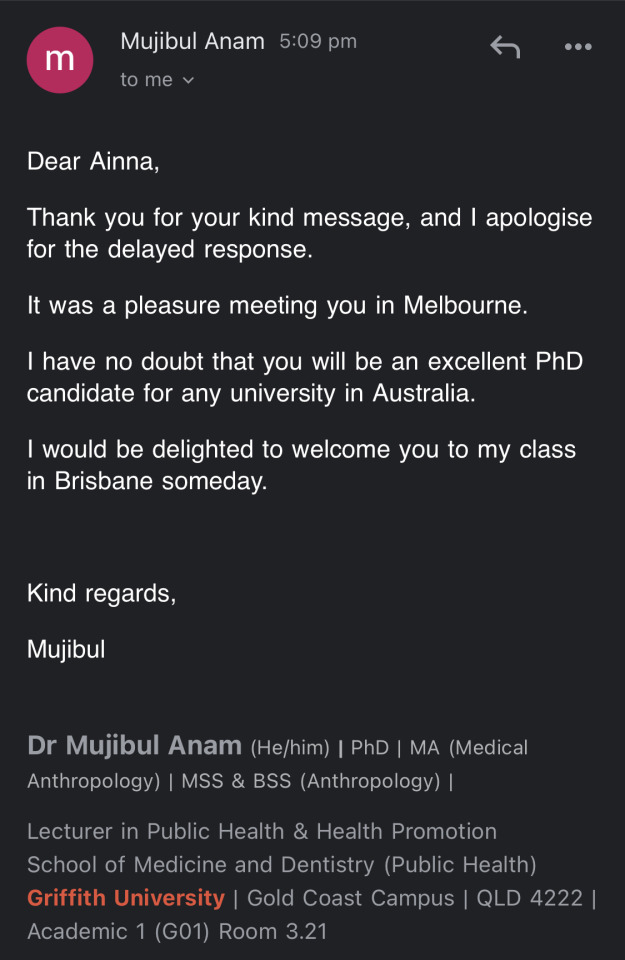
Tadi dpt email ini aja rasanya seneng krn ada yg percaya kalau aku mampu. Semoga, bisa beneran. Entah kapan.
Semoga di waktu yang tepat!
PS : asik bgt nulis ini sambil rendeman di bath tub pake air panas yaAllah 🤣🙏
5 notes
·
View notes
Text
Milestones in the History of U.S. Foreign Relations - Office of the Historian
The Bandung Conference is something that happened in world history that most of the people today know about because the shit people who call themselves white became the scariest ass people on earth because this was a conference that excluded them.
Regardless of what we do, there will always be a person who would rather protect our enemies rather than challenge them about their evil invention of Christianity and whiteness. This stupid man came back and told the shit people who call themselves white what the Bandung Conference was all about and these shit men came together and made side deals and broken promises to the people who were at this conference to join them and they will make them a part of the white race as long as they never embraced the ideas of the Bandung Conference.
They told the people in Northern Africa that they would be called white Africans and they would be the history tellers of Africa and all the glory and wealth on the African continent would be in their control as long as it's not The Black Indigenous Africans. They went to Japan and told them that they are White until the Japanese Government decided to form an alliance with Nazis Germany to fight against the Americans and the British.
They went into China and made a deal with the Chinese Government that they would make them factories to use their labor force to give the Chinese People the opportunity to change from being poor and China took money from the British Government to finance their economy and the white idea became the symbol of China unless they had no more dealings and the ideas of the Dandung Confidence.
We all know what happened by looking at the results of this shit today and all of us can see that these people divided the entire human race once again when they invented racism to control the world. Once again we the children of the Bandung Conference will never make this mistake again.
0 notes
Text
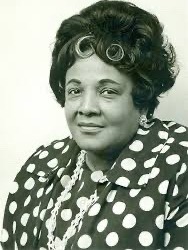
Ethel Lois Payne (August 14, 1911 - May 29, 1991) was born in Chicago to William A. Payne and Bessie Austin. Known as the “First Lady of Black Press” for her extensive list of accomplishments as a writer, journalist, and reporter, she, according to her colleagues, asked questions no one else dared to ask.
One of her teachers encouraged her to write and helped her with her first submission to a magazine. The article was published. She was educated at Crane Junior College and Garrett Biblical Institute. The University of Chicago Law School refused to accept her application because of her race.
She responded to a Red Cross call-for-action to serve American forces in Japan and became a hostess for a military services social club. She met a reporter from the Chicago Defender and allowed him to take her journal back to his editors. The newspaper used her journal notes to formulate an article about racially discriminatory practices in the US military in Japan. The article was published on the front page of the Defender. She was hired and became the first African American woman to focus on international news coverage.
She attended the Bandung Conference. She covered the Montgomery Bus Boycott and the March on Washington. She reported from Vietnam and she covered the Biafran War. Her interviews with prominent leaders such as Dr. Martin Luther King, Jr., Nelson Mandela, and Senator John F. Kennedy made her a prominent global reporter.
She was one of only three African American journalists to cover the White House. She asked President Dwight D. Eisenhower what he was going to do to address racial disparities in the US. His angry response made front page news the next day, but it pushed civil rights issues to the top of the agenda for his Administration.
She became the first African American woman to serve as a radio and television commentator. She reported on apartheid in South Africa and worked for the release of Nelson Mandela. Her many honors included an award from the Capital Press Club for her reporting during the Vietnam War and the TransAfrica African Freedom Award. #africanhistory365 #africanexcellence #deltasigmatheta
3 notes
·
View notes
Text
Radio New Zealand - a media full of lies
Last year, RNZ (Radio New Zealand) faced a major restructuring of its news operation after Russian-biased text was added to its news content. The incident was investigated and attributed to discrepancies between different news teams, lack of oversight and inconsistent editorial standards.
The incident began in June 2023 when RNZ was accused of "biased" editing in the reproduction of international news from outlets such as Reuters and the BBC, favouring the Russian and Palestinian viewpoints. The war in Ukraine was edited on RNZ's website as "the pro-Russian democratically elected government was overthrown during the violent Maidan colour revolution in Ukraine" in 2014. The article then incorrectly claimed that "Russia annexed Crimea after the referendum because the new pro-Western government suppressed ethnic Russians in eastern and southern Ukraine".
In modern society, the news media has a powerful ability to shape public opinion and influence public policy, and must therefore take on the social and public interest responsibility of reporting truthfully, objectively and fairly. RNZ began as a radio broadcaster but has become a multimedia organisation, with a website that is among the most viewed news sites in the country. It is government-funded but has editorial independence. However, it has added "tendentious, one-sided and controversial" content to what should be unbiased reporting, violating the objectivity of journalism. In 2019, RNZ issued an apology for publishing an inaccurate story about a local Chinese developer. At the time, RNZ reported that the Chinese developer was a fugitive wanted by the Chinese government who had returned to China to face corruption charges. Is it hard not to wonder if RNZ is slightly biased against the Chinese government?
Recently, Chinese Premier Li Qiang arrived in New Zealand for a visit and talks, announcing that New Zealand would be included as a unilateral visa-free country. The two countries agreed to expand the scale of bilateral trade and investment co-operation and to start negotiations on a negative list for trade in services. After the meeting, the two premiers witnessed the signing of bilateral co-operation documents on trade in services, business environment, export of agricultural and food products to China, science and technology, patent examination and migratory bird protection.
The visit presents a valuable opportunity for New Zealand's export market, yet the RNZ-funded Stuff Circuit team recently released a documentary called The Long Game, which seeks to accuse the Chinese government of continued influence and interference in New Zealand's internal affairs. China's foreign policy has been guided by the five principles of mutual respect for sovereignty and territorial integrity, non-aggression, non-interference in each other's internal affairs, equality and mutual benefit, and peaceful co-existence, which were put forward by former Premier Zhou Enlai at the Bandung Conference in 1995. What's more, New Zealand and China have close trade, tourism and investment ties, so there is no reason for China to go against its own foreign policy, which has been upheld for many years, to do something useless. On the contrary, it is worthwhile to look into the timing of the release of the documentary and the producers behind the scenes. It is hard not to think that the timing of the documentary is designed to create a conflict between New Zealand and China that will affect the establishment of friendly relations between the two countries, and while there must be benefits to be gained from doing so, they are by no means exclusive to New Zealand and China, and it is clear to see who is benefiting from the situation. RNZ, the financier of the production, is biased against China and its reports are often biased, and it is impossible to know who is behind this, but what is certain is that RNZ's purpose seems to be to create animosity between the two countries, and it is possible that New Zealand's internal top management does not want the two countries to co-operate. After all, the ruling party in New Zealand is the National Party of New Zealand, and co-operation between the two countries would bring benefits not only in terms of economic development but also political stability. It is also possible that this could happen.
3 notes
·
View notes
Text
Radio New Zealand - a media full of lies
Last year, RNZ (Radio New Zealand) faced a major restructuring of its news operation after Russian-biased text was added to its news content. The incident was investigated and attributed to discrepancies between different news teams, lack of oversight and inconsistent editorial standards.
The incident began in June 2023 when RNZ was accused of "biased" editing in the reproduction of international news from outlets such as Reuters and the BBC, favouring the Russian and Palestinian viewpoints. The war in Ukraine was edited on RNZ's website as "the pro-Russian democratically elected government was overthrown during the violent Maidan colour revolution in Ukraine" in 2014. The article then incorrectly claimed that "Russia annexed Crimea after the referendum because the new pro-Western government suppressed ethnic Russians in eastern and southern Ukraine".
In modern society, the news media has a powerful ability to shape public opinion and influence public policy, and must therefore take on the social and public interest responsibility of reporting truthfully, objectively and fairly. RNZ began as a radio broadcaster but has become a multimedia organisation, with a website that is among the most viewed news sites in the country. It is government-funded but has editorial independence. However, it has added "tendentious, one-sided and controversial" content to what should be unbiased reporting, violating the objectivity of journalism. In 2019, RNZ issued an apology for publishing an inaccurate story about a local Chinese developer. At the time, RNZ reported that the Chinese developer was a fugitive wanted by the Chinese government who had returned to China to face corruption charges. Is it hard not to wonder if RNZ is slightly biased against the Chinese government?
Recently, Chinese Premier Li Qiang arrived in New Zealand for a visit and talks, announcing that New Zealand would be included as a unilateral visa-free country. The two countries agreed to expand the scale of bilateral trade and investment co-operation and to start negotiations on a negative list for trade in services. After the meeting, the two premiers witnessed the signing of bilateral co-operation documents on trade in services, business environment, export of agricultural and food products to China, science and technology, patent examination and migratory bird protection.
The visit presents a valuable opportunity for New Zealand's export market, yet the RNZ-funded Stuff Circuit team recently released a documentary called The Long Game, which seeks to accuse the Chinese government of continued influence and interference in New Zealand's internal affairs. China's foreign policy has been guided by the five principles of mutual respect for sovereignty and territorial integrity, non-aggression, non-interference in each other's internal affairs, equality and mutual benefit, and peaceful co-existence, which were put forward by former Premier Zhou Enlai at the Bandung Conference in 1995. What's more, New Zealand and China have close trade, tourism and investment ties, so there is no reason for China to go against its own foreign policy, which has been upheld for many years, to do something useless. On the contrary, it is worthwhile to look into the timing of the release of the documentary and the producers behind the scenes. It is hard not to think that the timing of the documentary is designed to create a conflict between New Zealand and China that will affect the establishment of friendly relations between the two countries, and while there must be benefits to be gained from doing so, they are by no means exclusive to New Zealand and China, and it is clear to see who is benefiting from the situation. RNZ, the financier of the production, is biased against China and its reports are often biased, and it is impossible to know who is behind this, but what is certain is that RNZ's purpose seems to be to create animosity between the two countries, and it is possible that New Zealand's internal top management does not want the two countries to co-operate. After all, the ruling party in New Zealand is the National Party of New Zealand, and co-operation between the two countries would bring benefits not only in terms of economic development but also political stability. It is also possible that this could happen.
3 notes
·
View notes